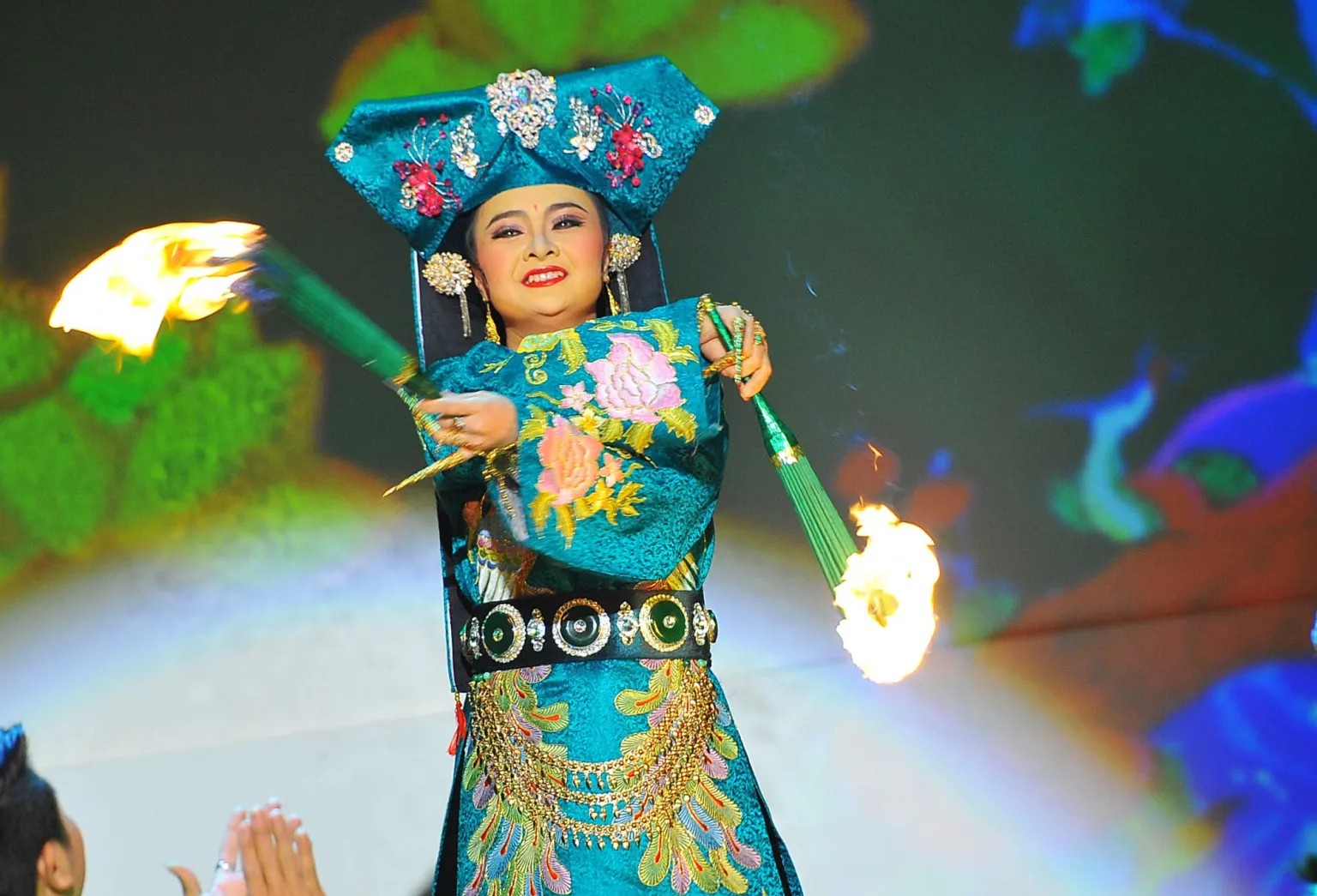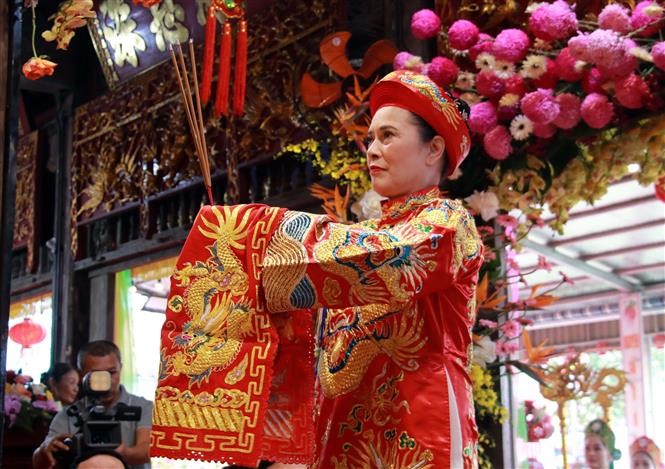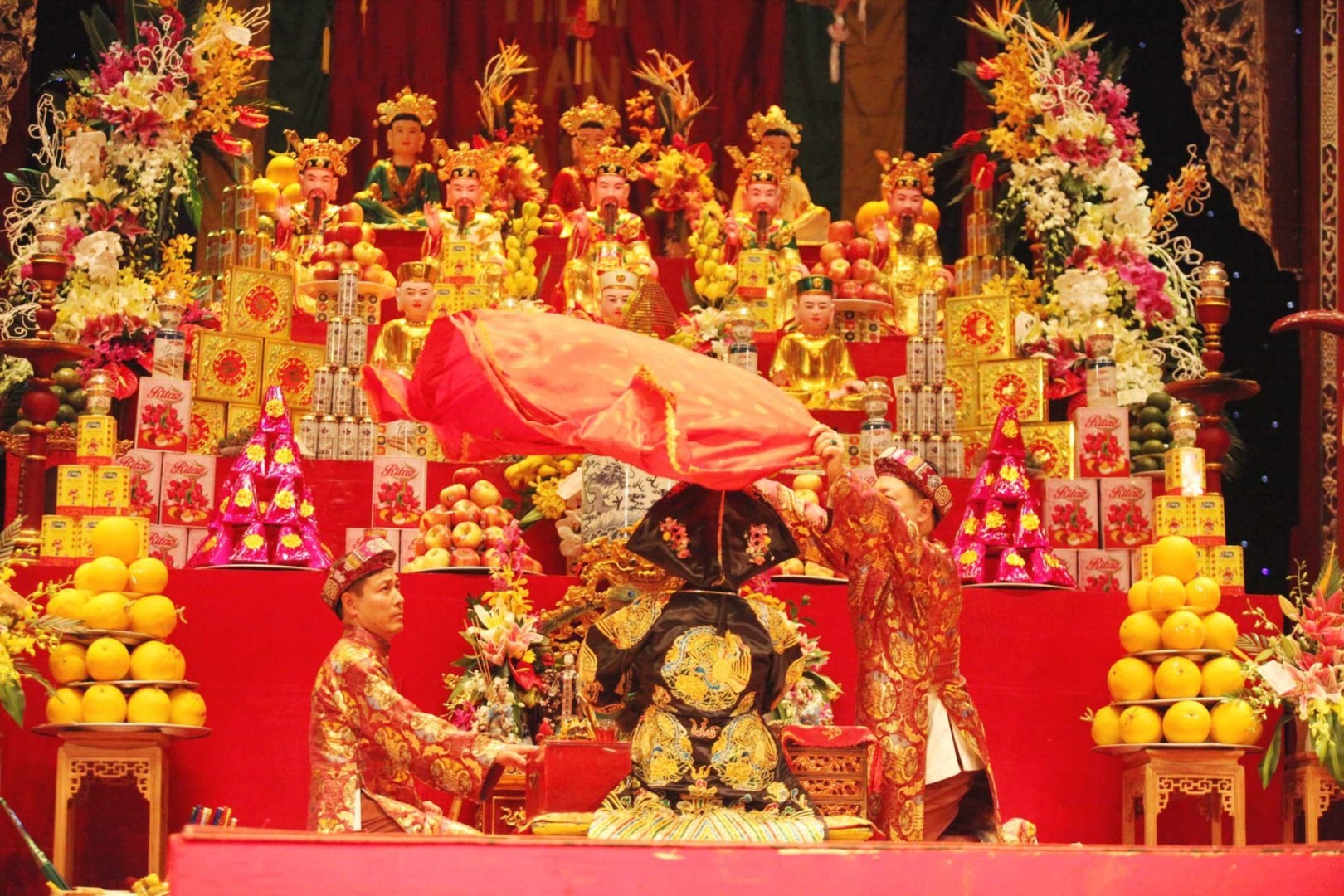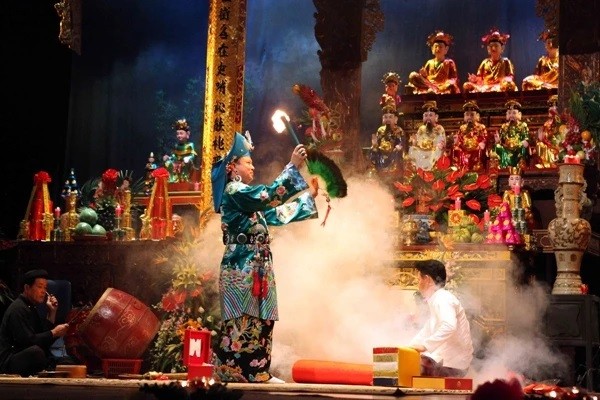Phu Day holds immense significance as a spiritual heartland for Dao Mau, the Vietnamese Mother Goddess Worship. SIXT.VN offers seamless travel experiences, allowing you to delve into this vibrant cultural heritage through expertly curated tours and transportation solutions. Discover the captivating story and traditions of Phu Day and Dao Mau with ease and comfort, enhancing your Vietnam journey.
1. What is Dao Mau (Mother Goddess Worship)?
Dao Mau, also known as the Vietnamese Mother Goddess Worship, is a unique religion deeply rooted in Vietnamese culture. It venerates a pantheon of Mother Goddesses, each representing different aspects of nature and life, like the sky, earth, water, mountains, and forests. This ancient belief system predates both Buddhism and Confucianism in Vietnam, with its origins tracing back to indigenous animistic beliefs. According to research from the Vietnam National University, in 2010, Dao Mau reflects the enduring strength of Vietnamese women and their connection to the spiritual world.
1.1 What are the Core Beliefs of Dao Mau?
At its core, Dao Mau emphasizes the feminine divine and the power of creation. The religion centers around the belief that the Mother Goddesses are benevolent protectors who can grant blessings, health, prosperity, and guidance to their devotees. The worship often involves elaborate rituals, including spirit possession ceremonies (len dong), chanting, music, and offerings.
1.2 What is the Significance of the Mother Goddesses?
The Mother Goddesses are not just deities but also cultural icons, embodying virtues such as compassion, strength, and resilience. Each goddess presides over specific domains and is associated with particular colors, symbols, and attributes. For example, Lieu Hanh, considered the “Mother of the World,” is one of the four immortal saints in Vietnamese folklore and is revered for her benevolence and miraculous powers.
1.3 How Does Dao Mau Reflect Vietnamese Culture?
Dao Mau reflects Vietnamese culture by blending indigenous beliefs with elements of Taoism, Buddhism, and Confucianism. This syncretic nature makes it a uniquely Vietnamese religion that resonates with people from all walks of life. It promotes social harmony, ethnic unity, and respect for nature, values deeply cherished in Vietnamese society.
 An artist performs “Tu phu” ( Four Realms) play inspired by trance rituals in the Mother Goddesses worship demonstrating artistic and spiritual depth
An artist performs “Tu phu” ( Four Realms) play inspired by trance rituals in the Mother Goddesses worship demonstrating artistic and spiritual depth
2. What is Phu Day?
Phu Day, located in Nam Dinh province, is considered the most important center of Dao Mau in Vietnam. This sacred complex is dedicated to Lieu Hanh, the Mother Goddess of the World, and attracts pilgrims and devotees from across the country and beyond.
2.1 What Makes Phu Day a Sacred Site?
Phu Day is sacred because it is believed to be the place where Lieu Hanh descended to earth and spent her life helping people. The complex comprises several temples, shrines, and monuments, each with its own unique history and significance. The architecture and artistry of Phu Day reflect the intricate details of Dao Mau cosmology and iconography.
2.2 What are the Key Structures within Phu Day?
Some of the key structures within Phu Day include:
- Tien Huong Temple: This is the main temple dedicated to Lieu Hanh and is the focal point of the complex.
- Mau Thượng Temple: Dedicated to the Mother Goddess of the Upper Realm.
- Ngu Cung: A smaller shrine where rituals and ceremonies are often held.
2.3 What Events and Festivals Take Place at Phu Day?
The Phu Day Festival, held annually from the 3rd to the 10th day of the third lunar month, is the most significant event at Phu Day. During this time, the complex comes alive with colorful processions, traditional music performances, spirit possession rituals, and various folk games and activities. The festival attracts thousands of pilgrims and tourists, creating a vibrant and festive atmosphere.
3. What is the History of Phu Day?
The history of Phu Day is intertwined with the legend of Lieu Hanh and the development of Dao Mau. Over the centuries, Phu Day has evolved from a small local shrine to a major religious center, reflecting the growing popularity and influence of Dao Mau in Vietnamese society.
3.1 How Did Phu Day Become a Center for Dao Mau?
Phu Day became a center for Dao Mau due to its association with Lieu Hanh, who is considered one of the most important deities in the pantheon. According to legends, Lieu Hanh descended to earth in Nam Dinh province and performed many miracles, earning the love and respect of the local people. As her following grew, Phu Day became a natural focal point for her worship.
3.2 What Historical Events Have Shaped Phu Day?
Throughout its history, Phu Day has been influenced by various historical events, including dynastic changes, social movements, and cultural exchanges. The complex has been renovated and expanded over the centuries, reflecting the changing tastes and resources of its patrons. Despite periods of disruption and conflict, Phu Day has remained a resilient symbol of Vietnamese spirituality.
3.3 How Has Phu Day Evolved Over Time?
Over time, Phu Day has evolved from a local shrine to a complex religious center. The complex has been expanded and renovated, and new structures have been added to accommodate the growing number of pilgrims and devotees. The rituals and ceremonies performed at Phu Day have also evolved, reflecting the changing needs and aspirations of the community.
4. What is the Significance of Lieu Hanh?
Lieu Hanh holds a central position in Dao Mau as the “Mother of the World” and one of the four immortal saints in Vietnamese folklore. Her story and attributes embody the core values and beliefs of Dao Mau, making her a beloved and revered figure.
4.1 Who Was Lieu Hanh?
According to legends, Lieu Hanh was a celestial being who descended to earth to experience human life and help people. She is often depicted as a beautiful and compassionate woman who possesses supernatural powers. Her life story is filled with tales of miracles, acts of kindness, and resistance against injustice.
4.2 What are the Attributes and Symbols Associated with Lieu Hanh?
Lieu Hanh is associated with various attributes and symbols that reflect her divine nature and role as a protector. She is often depicted wearing elaborate robes and a crown, symbolizing her royal status. Her symbols include flowers, fruits, and other offerings, representing abundance and prosperity. She is also associated with the color red, symbolizing vitality and good fortune.
4.3 How is Lieu Hanh Worshipped?
Lieu Hanh is worshipped through various rituals and ceremonies, including offerings, prayers, and spirit possession. Devotees often visit Phu Day to seek her blessings and guidance. During spirit possession ceremonies, mediums channel Lieu Hanh and other deities, providing insights and advice to the community.
5. What is the Role of Spirit Possession (Len Dong) in Dao Mau?
Spirit possession, known as “len dong,” is a central practice in Dao Mau. It involves mediums entering a trance state and channeling various deities, allowing them to communicate with the human world.
5.1 What Happens During a Spirit Possession Ceremony?
During a spirit possession ceremony, the medium (usually a woman) prepares by purifying herself and the ritual space. She then dons elaborate costumes and performs ritual dances, accompanied by traditional music. As she enters a trance state, she becomes the vessel for a particular deity, adopting their mannerisms, voice, and personality.
5.2 Who are the Key Figures Involved in Len Dong?
The key figures involved in “len dong” include:
- The Medium (Đồng thầy): The person who enters a trance state and channels the deities.
- The Assistants (Hầu dâng): Help the medium prepare for the ceremony and provide support during the trance.
- The Musicians (Cung văn): Play traditional music to invoke the deities and create a spiritual atmosphere.
5.3 What is the Purpose of Spirit Possession?
The purpose of spirit possession is to connect with the divine, seek guidance, and receive blessings. It also serves as a form of entertainment and cultural expression, showcasing the rich traditions of Dao Mau. Through spirit possession, devotees can gain insights into their lives, resolve conflicts, and find healing.
 Nam Dinh province is one of the localities having many typical centers of worshiping Mother Goddess Lieu Hanh reflecting the rich history of the province and the central role of Lieu Hanh
Nam Dinh province is one of the localities having many typical centers of worshiping Mother Goddess Lieu Hanh reflecting the rich history of the province and the central role of Lieu Hanh
6. How is Dao Mau Recognized by UNESCO?
In 2016, UNESCO recognized the “Practices Related to the Viet Beliefs in the Mother Goddesses of Three Realms” as an Intangible Cultural Heritage of Humanity. This recognition highlights the cultural and spiritual significance of Dao Mau and underscores the need to preserve and promote its traditions.
6.1 What Does UNESCO Recognition Mean for Dao Mau?
UNESCO recognition means that Dao Mau is recognized as a cultural treasure of humanity. This recognition brings international attention to the religion and provides support for its preservation and promotion. It also encourages communities to safeguard their traditions and pass them on to future generations.
6.2 What Efforts are Being Made to Preserve Dao Mau?
Various efforts are being made to preserve Dao Mau, including:
- Documentation and Research: Scholars and researchers are documenting the history, rituals, and music of Dao Mau.
- Cultural Preservation Programs: Organizations and communities are implementing programs to teach the traditions of Dao Mau to young people.
- Tourism Promotion: Phu Day and other Dao Mau centers are being promoted as tourist destinations to raise awareness and support local communities.
6.3 How Can Visitors Respectfully Experience Dao Mau?
Visitors can respectfully experience Dao Mau by:
- Dressing Modestly: When visiting temples and participating in ceremonies, it is important to dress modestly.
- Being Respectful: Show respect for the deities, the mediums, and the rituals.
- Asking Questions: If you have questions, ask respectfully and listen attentively to the answers.
- Supporting Local Communities: By visiting Phu Day and other Dao Mau centers, you can support local communities and contribute to the preservation of this unique cultural heritage.
7. What is “Van” Singing in Dao Mau?
“Van” singing, also known as “Chau Van,” is a unique form of Vietnamese traditional music that is closely associated with Dao Mau. It involves chanting and singing accompanied by instrumental music, creating a mesmerizing and spiritual atmosphere.
7.1 What are the Characteristics of “Van” Singing?
“Van” singing is characterized by its rhythmic melodies, poetic lyrics, and improvisational style. The songs often tell stories about the deities, historical figures, and moral lessons. The music is performed by a group of musicians playing traditional instruments such as the đàn nguyệt (moon lute), the đàn bầu (monochord), and percussion instruments.
7.2 How Does “Van” Singing Enhance Spirit Possession Ceremonies?
“Van” singing enhances spirit possession ceremonies by creating a spiritual atmosphere and invoking the deities. The music and lyrics are carefully chosen to match the specific deity being channeled, helping the medium enter a trance state and connect with the divine. The melodies are hypnotic and repetitive, allowing the audience to enter a state of contemplation and reverence.
7.3 How is “Van” Singing Being Preserved?
“Van” singing is being preserved through various efforts, including:
- Training Programs: Music schools and cultural organizations are offering training programs to teach young people the art of “Van” singing.
- Performances and Festivals: “Van” singing performances are being organized at festivals and cultural events to raise awareness and appreciation for this unique art form.
- Recordings and Documentation: Recordings and documentation of “Van” singing are being made to preserve the music for future generations.
 “Van” singing performance in a meeting on reviewing Mother Goddess Worship reflecting the cultural richness of the performance and its importance in Dao Mau
“Van” singing performance in a meeting on reviewing Mother Goddess Worship reflecting the cultural richness of the performance and its importance in Dao Mau
8. How Can SIXT.VN Enhance Your Visit to Phu Day?
SIXT.VN offers a range of services to enhance your visit to Phu Day, ensuring a seamless and enriching experience. From airport transfers to customized tours, SIXT.VN can take care of all your travel needs.
8.1 What Transportation Options Does SIXT.VN Provide?
SIXT.VN provides a variety of transportation options, including:
- Airport Transfers: Convenient and reliable airport transfers to and from Hanoi and other nearby cities.
- Private Car Rentals: Rent a private car with a driver for flexible and personalized transportation.
- Group Transportation: Arrange transportation for groups of any size, ensuring everyone travels comfortably and safely.
8.2 What Tour Packages Does SIXT.VN Offer for Phu Day?
SIXT.VN offers customized tour packages for Phu Day, including:
- Day Trips: Guided day trips to Phu Day from Hanoi, including transportation, entrance fees, and lunch.
- Multi-Day Tours: Explore Phu Day and other cultural sites in Nam Dinh province with multi-day tours that include accommodation and meals.
- Customized Itineraries: Create your own itinerary with the help of SIXT.VN’s travel experts, ensuring you see and do everything you want.
8.3 How Can SIXT.VN Help with Accommodation and Other Travel Arrangements?
SIXT.VN can assist with accommodation and other travel arrangements, including:
- Hotel Bookings: Find and book the perfect hotel in Nam Dinh province or Hanoi.
- Visa Assistance: Get help with visa applications and other travel documents.
- Travel Insurance: Protect your trip with comprehensive travel insurance.
9. What Other Attractions are Near Phu Day?
Nam Dinh province offers a variety of other attractions that can be combined with a visit to Phu Day, providing a deeper understanding of the region’s culture and history.
9.1 What are Some Historical Sites in Nam Dinh?
Some historical sites in Nam Dinh include:
- Co Le Pagoda: A beautiful pagoda with a rich history and unique architecture.
- Tran Temple: Dedicated to the Tran Dynasty emperors who ruled Vietnam in the 13th and 14th centuries.
- Nam Dinh Citadel: The remains of an ancient citadel that once served as the provincial capital.
9.2 What are Some Natural Attractions in Nam Dinh?
Some natural attractions in Nam Dinh include:
- Xuan Thuy National Park: A coastal wetland area that is home to a variety of bird species.
- Hai Hau Beach: A popular beach resort with white sand and clear water.
- Ninh Co Church: Known as the most beautiful abandoned church in Vietnam.
9.3 What Local Cuisine Should You Try in Nam Dinh?
Some local cuisine you should try in Nam Dinh include:
- Pho Bo Nam Dinh: A local variation of the popular beef noodle soup.
- Banh Gai: A sticky rice cake filled with mung beans and coconut.
- Nem Chua Ran: Fried fermented pork rolls.
10. What are Some Tips for Visiting Phu Day?
To make the most of your visit to Phu Day, consider these tips:
10.1 What is the Best Time to Visit Phu Day?
The best time to visit Phu Day is during the Phu Day Festival, held from the 3rd to the 10th day of the third lunar month (usually in April or May). However, the complex is open year-round and can be visited at any time.
10.2 What Should You Wear When Visiting Phu Day?
When visiting Phu Day, it is important to dress modestly. Avoid wearing revealing clothing or shorts. Comfortable shoes are recommended, as you will be doing a lot of walking.
10.3 What Should You Bring When Visiting Phu Day?
When visiting Phu Day, you should bring:
- Sunscreen: Protect your skin from the sun.
- Hat: Shield your head from the sun.
- Water: Stay hydrated, especially during the hot months.
- Camera: Capture the beauty and spirituality of Phu Day.
- Cash: Small bills for offerings and souvenirs.
SIXT.VN can help you plan and prepare for your visit to Phu Day, ensuring a memorable and enriching experience.
 In 2016, the “Practices Related to the Viet Beliefs in the Mother Goddesses in Three Realms” is officially recognised by UNESCO as an Intangible Cultural Heritage of Humanity reflecting the global recognition of Dao Mau's importance
In 2016, the “Practices Related to the Viet Beliefs in the Mother Goddesses in Three Realms” is officially recognised by UNESCO as an Intangible Cultural Heritage of Humanity reflecting the global recognition of Dao Mau's importance
FAQ About Phu Day and Dao Mau
1. What is the main purpose of Phu Day?
Phu Day is the main center for worshiping Mother Goddess Lieu Hanh, one of the four immortals in Vietnamese folk religion, attracting pilgrims seeking blessings and spiritual guidance.
2. How does Dao Mau differ from other religions in Vietnam?
Unlike Buddhism and Confucianism, Dao Mau focuses on the worship of Mother Goddesses and spirits, emphasizing the feminine divine and its connection to nature.
3. Can anyone participate in Dao Mau rituals?
Yes, Dao Mau is open to everyone, regardless of their background, gender, or social status, promoting inclusivity and community spirit.
4. What should I expect during a spirit possession ceremony?
Expect to witness mediums channeling various deities through elaborate costumes, music, and dance, creating a captivating and spiritual experience.
5. How can I get to Phu Day from Hanoi?
SIXT.VN offers convenient transportation options, including private car rentals and airport transfers, to ensure a comfortable journey from Hanoi to Phu Day.
6. Are there any specific customs to observe when visiting Phu Day?
Dress modestly, show respect for the deities and rituals, and avoid making loud noises or disruptive behavior.
7. What is the significance of the Phu Day Festival?
The Phu Day Festival is a major event celebrating Mother Goddess Lieu Hanh, featuring colorful processions, traditional music, and various folk activities, attracting thousands of visitors.
8. How has UNESCO recognition impacted Dao Mau?
UNESCO recognition has raised awareness and provided support for the preservation and promotion of Dao Mau as a significant part of Vietnamese cultural heritage.
9. What role does music play in Dao Mau rituals?
Music, especially “Van” singing, is essential in creating a spiritual atmosphere and invoking the deities during Dao Mau rituals, enhancing the overall experience.
10. Where can I find reliable information about Dao Mau and Phu Day?
You can find reliable information on the official websites of UNESCO, the Vietnam National Administration of Tourism, and reputable cultural organizations.
Ready to explore the mystical world of Phu Day and Dao Mau? Let SIXT.VN be your trusted companion, providing seamless travel experiences tailored to your needs. From airport transfers and hotel bookings to customized tour packages, we ensure a hassle-free and enriching journey. Contact us today at +84 986 244 358 or visit SIXT.VN to discover the magic of Vietnam. Address: 260 Cau Giay, Hanoi, Vietnam.



